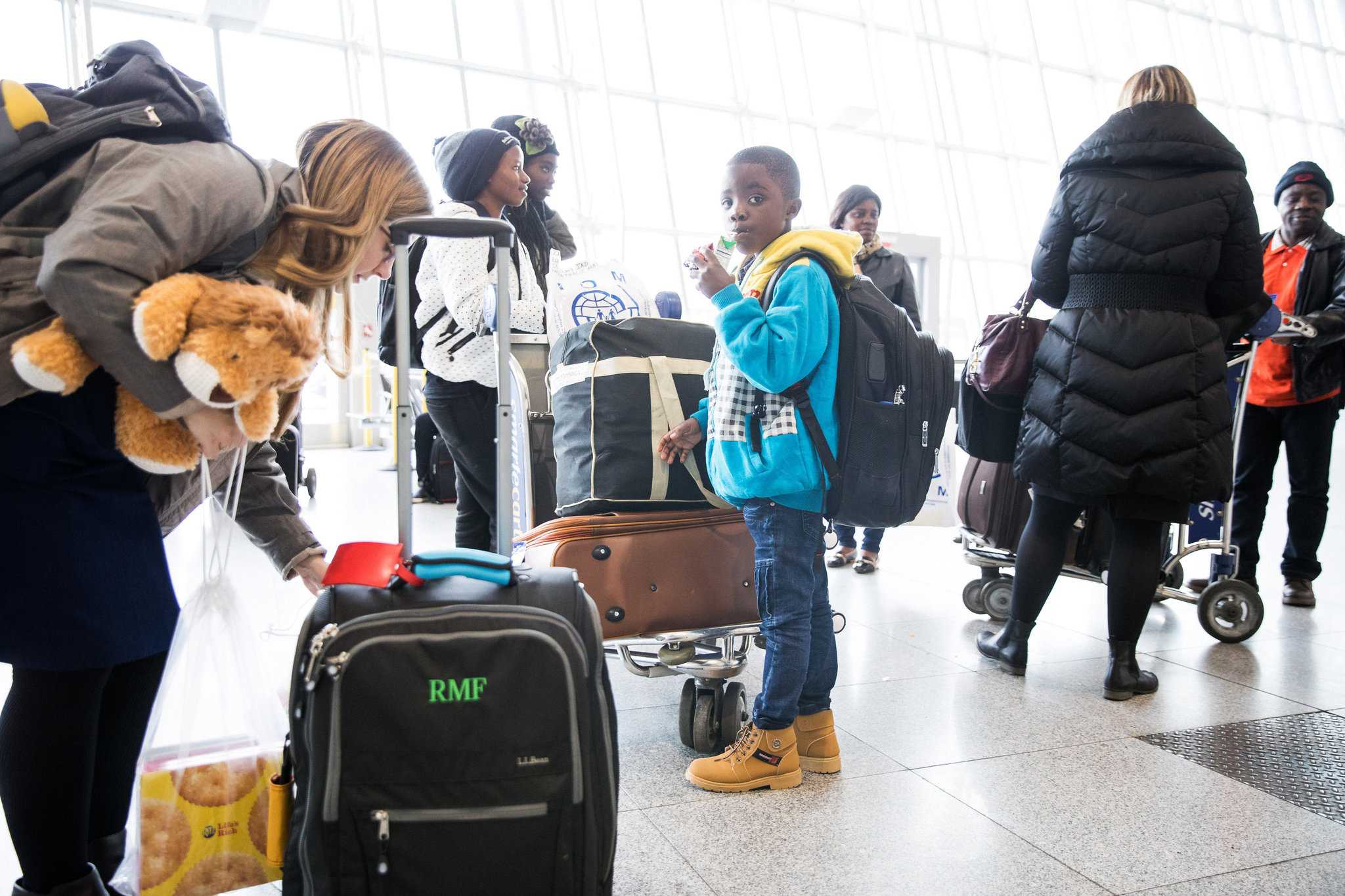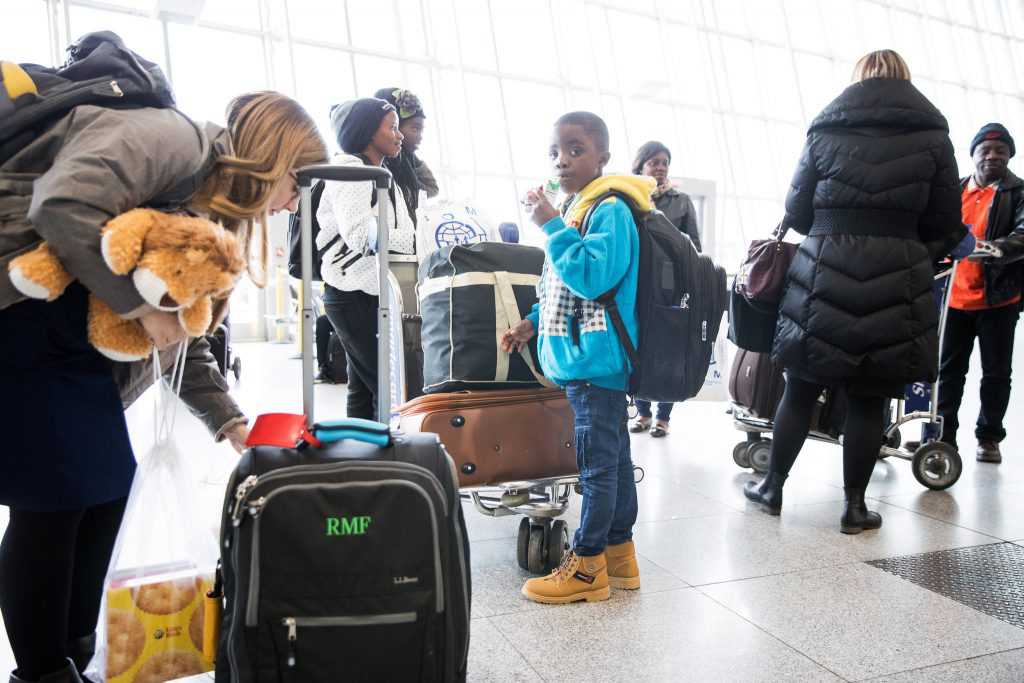
At Kennedy International Airport on Tuesday afternoon, a refugee family of five arrived on an 18-hour flight from Africa and, unlike others who had hoped to enter the country over the weekend, was soon standing outside the airport, watching as snow fell like confetti.
These refugees were not from the group of seven predominantly Muslim countries named in President Trump’s executive order on immigration, but from the Democratic Republic of Congo; after fleeing gunshots from rebel fighters in their district of Uvira in 2010, they had spent six years in a refugee camp in Malawi.
The exemption that allowed for their entry had been coordinated with the State Department during the turmoil after Mr. Trump’s order suspending the arrival of refugees for 120 days. According to a State Department official who spoke on condition of anonymity, the order allowed for exemptions to admit refugees “when in the national interest and when they do not pose a risk to U.S. security or welfare, including for certain religious minorities and certain refugees in transit.”
Church World Service, one of the nine resettlement agencies in the nation that contract with the State Department, said 872 refugees had been approved for resettlement before the end of the day Thursday.
At Kennedy International Airport on Tuesday afternoon, a refugee family of five arrived on an 18-hour flight from Africa and, unlike others who had hoped to enter the country over the weekend, was soon standing outside the airport, watching as snow fell like confetti.
These refugees were not from the group of seven predominantly Muslim countries named in President Trump’s executive order on immigration, but from the Democratic Republic of Congo; after fleeing gunshots from rebel fighters in their district of Uvira in 2010, they had spent six years in a refugee camp in Malawi.
The exemption that allowed for their entry had been coordinated with the State Department during the turmoil after Mr. Trump’s order suspending the arrival of refugees for 120 days. According to a State Department official who spoke on condition of anonymity, the order allowed for exemptions to admit refugees “when in the national interest and when they do not pose a risk to U.S. security or welfare, including for certain religious minorities and certain refugees in transit.”
Church World Service, one of the nine resettlement agencies in the nation that contract with the State Department, said 872 refugees had been approved for resettlement before the end of the day Thursday.
At Kennedy Airport, the family waited alongside other refugees from Congo. Some were headed to North Carolina, and others to Connecticut, also to be resettled by Church World Service.


The family members were aware of the order when they landed and were relieved that they had made it in time. “Thank God — because we couldn’t believe that,” said Masumbuko, 38, standing in Terminal 4 with his wife, Roza; his two daughters, Nathalie, 20, and Kwizi, who turns 13 on Wednesday; and their 8-year-old son, Leo. “We are so happy.”
Church World Service, which was resettling the family, asked that their last name not be published because of fears for the family’s safety.
The family was heading north to the Hudson Valley, where Christ Episcopal Church and Vassar College — both in Poughkeepsie, N.Y. — had arranged for their resettlement.
Despite support from 1,200 volunteers from 30 organizations, Vassar Temple, Masjid al-Noor Mosque and seven local colleges, a protest and death threat surfaced online.
Still, there were only smiles, hugs and shouts of welcome when the volunteers from Christ Church met the family at the Stewart International Airport parking lot near Newburgh, N.Y.
“It’s a testimony to all the people in the church and in the community who made this happen,” said the Rev. Susan Fortunato. “Quite honestly, if I can take a small professional stand, it was a little faith and maybe divine intervention that made sure that these folks could get in before the borders were closed for refugees.”
The trip from Kennedy Airport was subdued, as if the passing landscape in white and gray made the trip that much more surreal. The van was provided by the International Organization for Migration. The driver, Jimmy Yu, immigrated to the United States from Hong Kong in 1991.


For six years, Masumbuko, who goes by the nickname Masu, explained, they lived in a house with a thatched roof and mud walls, in a camp of more than 20,000 people with refugees from Somalia, Rwanda, Ethiopia and Burundi. Masu was a nurse who routinely delivered babies — including twins, three times. Roza worked sewing clothes.
Masu said their first interview to get to the United States was in March 2011, when they registered as refugees. They had more interviews, including screening by the United Nations High Commission for Refugees in 2014, interviews with immigration officers of the United States, and health and final security clearances.
They were approved for relocation in October 2016. From then, they had cultural orientation sessions in Malawi, as they prepared to embark to their new home.
Thank you for subscribing.
An error has occurred. Please try again later.
You are already subscribed to this email.
View all New York Times newsletters.
The final interview was after the family deplaned at Kennedy. Customs and Border Protection, which in the previous two days had detained visa holders and permanent residents in what was a scene of chaos at airports worldwide, asked Masu several questions about his reasons for leaving Congo, his line of work and his family.
Both his father, a village elder, and his brother, a priest, were murdered by rebels in 1996. Masu had become the director of the nursing department at a hospital, which made him a target for rebel groups, he said.
One week after gunmen entered his house looking for him, he moved his family to Malawi.
His move to the United States was made possible by a group called Mid-Hudson Refugee Solidarity Alliance. A German history professor at Vassar College, Maria Höhn, first had the idea in 2015 and consulted with a refugee group in Connecticut that was working with Church World Service.

On Tuesday, Sarah Krause, a senior director at Church World Service, acknowledged that this celebratory day was bittersweet. This was the first family, and would probably be the last, they could receive in the Hudson Valley.
“This 120-day ban is going to make it very hard to keep this office open,” Ms. Krause explained. “Without any refugees to the office, we won’t have any funding. We will do everything that we can to maintain the capacity of the office and without question will provide services for this family.”
Some immediate financial assistance is provided by the government. Masu hopes to begin working as a nurse, but he does not know how to drive a car. Volunteers took the family to their new apartment, first passing a string of fast-food chains. At the McDonald’s sign, Masu shrugged and confessed he had never heard of it.
When volunteers drove up to their two-bedroom apartment, Leo got out of the car, gingerly took a few steps onto the snow and took off running to the door. Volunteers had stocked the refrigerator and the cabinets with food. The table was set for five, with flowers.
“Magnifique!” Roza exclaimed, beaming.
We’re interested in your feedback on this page. Tell us what you think.




























